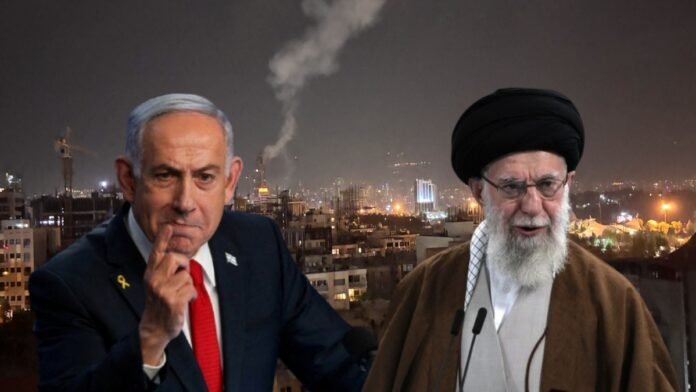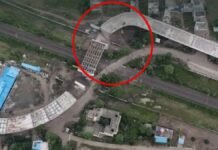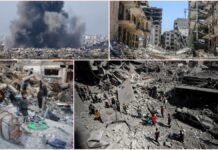
Key Points
- Israel launched massive airstrikes on Iranian nuclear and military sites, killing top commanders and scientists, including the IRGC chief.
- Iran retaliated with “Operation True Promise 3,” launching over 150 ballistic missiles and more than 100 drones at Israel.
- Explosions rocked Tel Aviv and Jerusalem; at least one civilian was killed and dozens injured in Israel.
- Israeli air defenses, with U.S. assistance, intercepted many incoming missiles, but significant damage and casualties were reported.
- U.S. President Trump warned Iran, referencing a 60-day ultimatum and threatening further action while urging Iran to negotiate on its nuclear program.
- The conflict marks a dramatic escalation, with international calls for restraint amid fears of a broader Middle East war.
New Delhi: The Middle East is on the brink of a wider conflict after Israel and Iran exchanged their most direct and devastating attacks to date. The confrontation began early Friday when Israel launched a sweeping offensive codenamed “Operation Rising Lion” targeting key Iranian nuclear facilities and military bases. The strikes killed at least 78 people, including top generals, nuclear scientists, and civilians, according to Iranian officials, though independent verification of these numbers remains pending.
Among the dead were senior Islamic Revolutionary Guard Corps (IRGC) commanders Hossein Salami and Mohammad Bagheri, as well as the head of Iran’s nuclear program. The Natanz nuclear facility, a cornerstone of Iran’s uranium enrichment efforts, was among the sites hit. Fires and explosions were reported in Tehran and other cities, with widespread damage to both military and civilian infrastructure.
Iran Responds with ‘Operation True Promise 3’
In a swift and forceful response, Iran launched “Operation True Promise 3,” firing more than 150 ballistic missiles and over 100 drones at Israeli targets late Friday and into Saturday. The IRGC declared the operation a direct response to what it called Israel’s “criminal aggression,” vowing further action if necessary.
Air raid sirens blared across Tel Aviv, Jerusalem, and northern Israel as explosions lit up the night sky. Israeli emergency services confirmed at least one civilian death a woman in Ramat Gan and more than 40 injuries, with several in critical condition. Buildings in Tel Aviv were struck, causing fires and trapping residents, while shrapnel from intercepted missiles caused additional casualties and damage in multiple locations.
Israeli and U.S. Defenses Activate
Israel’s Iron Dome and other missile defense systems intercepted many of the incoming projectiles, but several missiles penetrated defenses, hitting central Tel Aviv and other urban areas. U.S. forces provided critical support, with American troops in the region ordered into bunkers during the barrage. The Israeli military reported that most of the drones and missiles were destroyed before reaching their targets, but acknowledged significant impacts and ongoing rescue operations.
Trump’s Ultimatum and Threats
Amid the escalating violence, U.S. President Donald Trump revealed that his administration had been fully aware of Israel’s plans and had given Iran a 60-day ultimatum to negotiate on its nuclear program. Trump warned that Iran now faces a “second chance” but threatened even harsher measures if Tehran refuses to come to the table, stating, “There’s still an opportunity for them to negotiate, it’s not too late”.
Trump praised Israel’s strikes as “excellent” and reiterated that further attacks could follow if Iran does not comply with U.S. demands. While the U.S. denied direct involvement in the Israeli operation, it confirmed advance knowledge and support for Israel’s right to self-defense.
Regional and Global Repercussions
The unprecedented direct confrontation between Israel and Iran has triggered widespread international alarm. United Nations Secretary-General Antonio Guterres called for an immediate halt to hostilities and urged both sides to pursue diplomacy, warning of the catastrophic potential for a broader Middle East war.
The conflict has already disrupted global oil markets, shipping routes, and air traffic, with governments worldwide urging restraint. Both Israel and Iran have signaled readiness for further escalation if provoked, raising fears that the violence could spiral beyond their borders.
With both sides suffering heavy losses and neither showing signs of backing down, the world watches anxiously as the Israel-Iran crisis enters a dangerous new phase. The coming days will be critical in determining whether diplomacy can prevail or if the region will plunge deeper into war.





















































